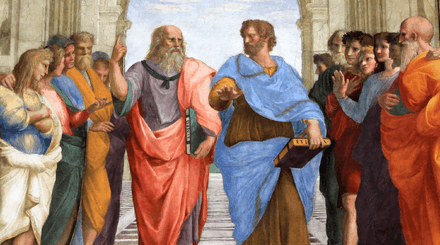17th-century philosophy
17th century philosophy is generally regarded as seeing the start of modern philosophy, and the shaking off of the medieval approach, especially scholasticism. It succeeded the Renaissance and preceded the Age of Enlightenment. It is often considered to be part of early modern philosophy.
| History of Western philosophy |
|---|
 |
| The School of Athens fresco by Raphael |
| Western philosophy |
|
|
| See also |
History
The period is usually taken to start in the seventeenth century with the work of René Descartes, who set much of the agenda as well as much of the methodology for those who came after him. The period is typified in Europe by the great system-builders — philosophers who present unified systems of epistemology, metaphysics, logic, and ethics, and often politics and the physical sciences too. Immanuel Kant classified his predecessors into two schools: the rationalists and the empiricists,[1] and early modern philosophy is often characterised in terms of a conflict between these schools.
The three main rationalists are normally taken to have been Descartes, Baruch Spinoza, and Gottfried Leibniz. Building upon their English predecessors Francis Bacon and Thomas Hobbes, the three main empiricists were John Locke, George Berkeley, and David Hume. The former were distinguished by the belief that, in principle (though not in practice), all knowledge can be gained by the power of our reason alone; the latter rejected this, believing that all knowledge has to come through the senses, from experience. Thus the rationalists took mathematics as their model for knowledge, and the empiricists took the physical sciences.
This period also saw the birth of some of the classics of political philosophy, especially Thomas Hobbes' Leviathan, and John Locke's Two Treatises of Government.
The seventeenth century in Europe saw the culmination of the slow process of detachment of philosophy from theology. Thus, while philosophers still talked about – and even offered arguments for the existence of – a deity, this was done in the service of philosophical argument and thought. (In the Enlightenment, the "Age of Reason", 18th-century philosophy was to go still further, leaving theology and religion behind altogether.)
List of seventeenth century philosophers
- Francisco Suárez (1548–1617)
- René Descartes (1596–1650)
- Benedict Spinoza (1632–1677)
- Nicolas Malebranche (1638–1715)
- Isaac Newton (1642–1727)
- Gottfried Leibniz (1646–1716)
- Pierre Bayle (1647–1706)
- Damaris Cudworth Masham (1659–1708)
- Mary Astell (1666–1731)
- John Locke (1632-1704)